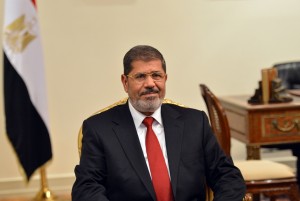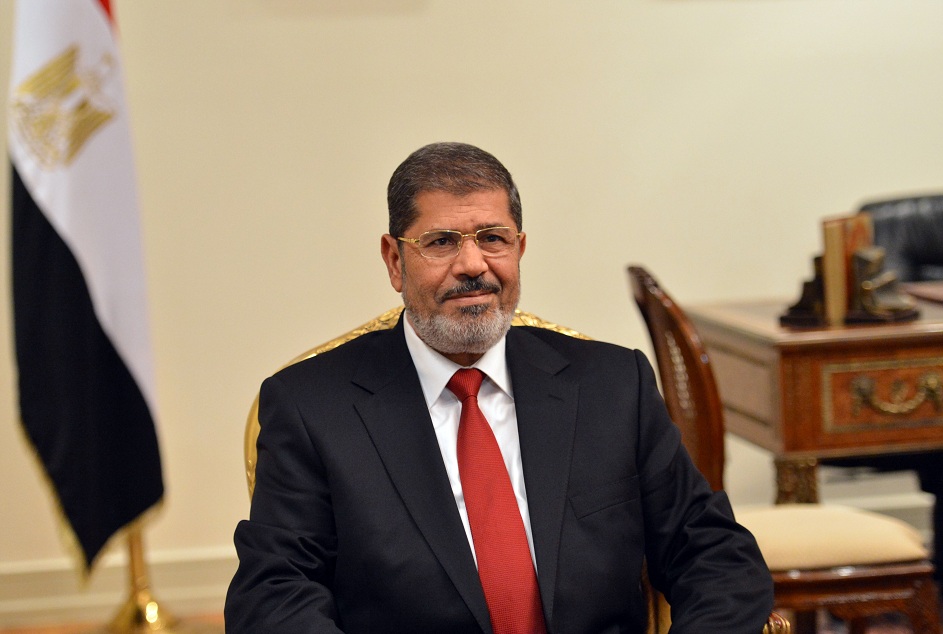
AFP PHOTO/KHALED DESOUKI
By: Nada Badawi
When asked about what is being offered to help the average Egyptian citizen, Morsi referred to a number of key national developmental projects which will serve in the people’s best interest.
“The country is running several development projects in the Suez Canal, North Siwa, Nubia, New Valley, Nasser Lake and North Coast,” he said.
He added that there’s also a call to distribute lands evenly between investors to kick start big and small businesses. There are also around EGP 600m being invested in slum areas in Egypt.
Another project mentioned was health insurance which will cost EGP 5bn in which its first stage is to be completed by next year.
“The health insurance project aims at securing insurance for all Egyptians,” he said.
Morsi later on emphasised that the only way such businesses can begin working effectively is when political and economic stability are both achieved.
“I introduced tax increases and legislative procedures so that those who are able to feed themselves can feed the poor.”
Other economic decisions Morsi said the government would soon announce is to exempt students in public schools and universities from paying tuition fees they cannot afford for this academic semester.
With regards to businesses incapable of operating at the time due to the current economic crisis, he explained that “the country is still in a transitional phase, and is still facing problems, and I understand how difficult it is for some to continue working.”
Despite factory closures and businesses shutting down, he referred to his last meeting with 140 businessmen last week.
He stated that businessmen are always accompanying him during his travels abroad so that “they take initiative and start new projects.”
In the face of all new projects, Morsi highlighted economic obstacles that are getting in the way of the government, such as corruption, uneven distribution of income and high unemployment rate.
He said that such problems are concurrent and have long existed since Mubarak’s rule.
Morsi stated that there are now more than 17 million Egyptians working in the private sector, 6 million in the public sector, 13 million in agriculture, in addition to drivers, craftsmen and many others.
“I am aware of problems faced by people from all sectors, and I make sure to include them all in my economic decisions,” he said in a
El-Leithy later on went to ask Morsi about about Egypt’s relations with Qatar, in which he replied to saying: “relations with Qatar are on excellent terms just like how it is with the rest of the Arab countries.”
On Qatar’s investments and land purchases in the Suez Canal, he commented on the topic rather sarcastically describing the Suez Canal as a “historical landmark that was built by the hands of Egyptians” indicating that El-Leithy’s statement isn’t true.
On the subject of the usury from International Monetary Fund (IMF) loan, which is considered a prohibited practice in Islam, Morsi said that the government held several talks with clerics and experts all of whom concluded that “the value is very low and is considered more of an administrative fee.”
He described the IMF loan as a “testimony on how capable Egypt is of transitioning economically rather than a funding opportunity.”
“The current economic market does not conflict with an Islamic economy or the system of Sukuk,” he said making note that the system of Sukuk is “one of the ways to fund the country, but is not the solution.”
At the end of the interview, Morsi mentioned the government’s attempts to help Egyptians with minimum wages and those who live hand-to-mouth.
“I announced a minimum monthly income for income tax exemption to be raised from 9,000 to 12,000 Egyptian pounds which should help alleviate a tax burden on 2.5 million families,” Morsi said.




